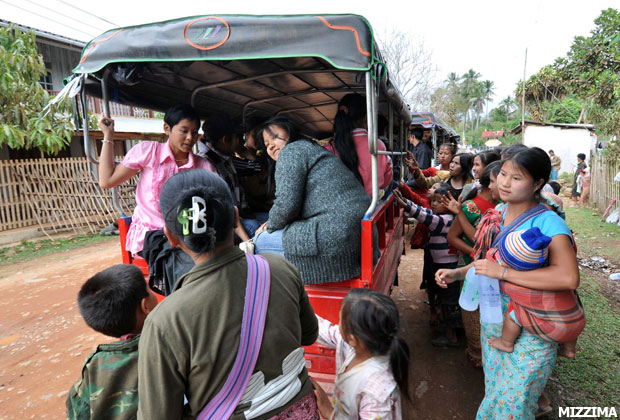Chiang Mai (Mizzima) – A woman was crying in front of a crumbled house: ‘My son just finished the 10th grade and was about to study Chinese...now he’s gone’, she said through her tears.

Nang Aur is the mother of Sai Hseng Tip, who was 18. The boy had returned to his hometown on summer vacation. Sai Hseng Tip was a bright boy, and his parents had sent him to Tachilek for a better education in a bigger town.
Sai Hseng Tip fulfilled his parents' dream by passing the 10-grade examination. But then the earthquake eastern Shan State on March 24, and he and six friends lost their lives.
While aid has reached many people in the more populated areas, many rural villagers are still without such essentials as food, clean water, kitchen supplies and material to create a livable shelter.
The United Nations office for the coordination of humanitarian affairs report on March 30 said 74 people died and 125 were injured. Around 702 houses were damaged. The Myanmar Red Cross Society (MRCS) reported that 3,152 people were homeless.
UNICEF and MRCS in close coordination with Noble Compassionate Volunteer (NCV) and World Vision Myanmar say that at least 18,000 people in 90 villages have been moderately or severely affected by the quake.
In the 50 most severely affected villages, more than 50 per cent of all buildings have either been damaged or destroyed. In the 40 remaining villages, more than 30 percent of all buildings have been damaged or destroyed.
Individual businesses and companies in Tachilek and Mae Sai have sent aid packages to the victims. In Tachilek, the abbot of Wat Hsai Mong took a leading role in delivering the aid. According to an eyewitness, ‘The abbot delivered his assistance to victims without any interference from the local authorities.’
The source said that some observers doubted that the Myanmar authorities would deliver all the aid to the victims, saying it appeared that some soldiers were taking aid supplies to military bases at night.
Sai Pong, a Tachilek resident, said, ‘Some of the villages still have not received assistance from the Burmese regime due to slow delivery’.
A member of the Shan Nationalities of Democratic Party (SNLD) said the group has also sent medicine, food, dry noodle, blankets and water to the earthquake victims, but he said, ‘The assistance is still not enough. People need mats and tarpaulins. We assist them with food but it only lasts for 2-3 days’.
It will take a long time for villagers to return to normal life, he said.
Vice President Dr. Sai Mawk Kham visited the earthquake area, but did not spend much time because of security concerns. One observer said the visit was meant to give Sai Mawk Kham credibility within the Shan community, and to convince his critics that he did the right thing by joining the new government.
One local critic said, ‘He is still a puppet who plays to the regime’s tune’.
However, another said: ‘Regardless of who has the upper hand, it’s important that both sides focus on helping the earthquake victims’.
Even while Shan migrant workers in Chiang Mai and other areas of Thailand have sent aid donations to the victims, many remote villages are still in need of help.


